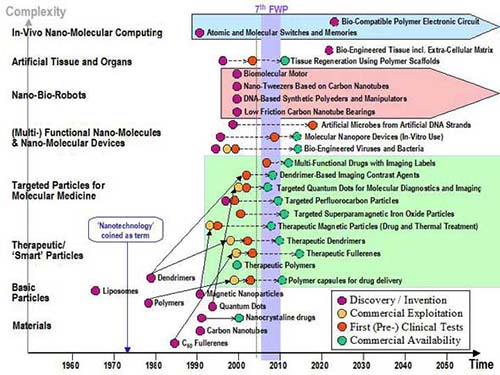| Posted: Jan 08, 2008 | |
Ethical aspects of nanotechnology in medicine |
|
| (Nanowerk Spotlight) For centuries, man has searched for miracle cures to end suffering caused by disease and injury. Many researchers believe nanotechnology applications in medicine may be mankind’s first 'giant step' toward this goal. | |
| According to Freitas nanomedicine is "...(1) the comprehensive monitoring, control, construction, repair, defense, and improvement of all human biological systems, working from the molecular level, using engineered nanodevices and nanostructures; (2) the science and technology of diagnosing, treating, and preventing disease and traumatic injury, of relieving pain, and of preserving and improving human health, using molecular tools and molecular knowledge of the human body; (3) the employment of molecular machine systems to address medical problems, using molecular knowledge to maintain and improve human health at the molecular scale." | |
| Nanomedicine not only has the potential to change medical science dramatically but to open a new field of human enhancements that is poised to add a profound and complex set of ethical questions for health care professionals. For instance, there is a fine line between medical and non-medical uses of nanotechnology for diagnostic, therapeutic and preventive purposes (e.g. non-medical implants in soldiers). | |
| The question of whether nanotechnology should be used to make intentional changes in or to the body when the change is not medically necessary is just one hot topic in a long list of concerns. The good news is that these questions are being asked, but there is still much work to be done, but despite the enormous promise of nanomedicine, and the considerable funding going into the field, the research into the ethical, legal and social implications of nanomedicine is comparatively minute. | |
| As Peter Singer wrote in his 2003 tutorial Mind the gap: science and ethics in Nanotechnology: “The science leaps ahead, the ethics lags behind.” As with nanotechnology in general, there is danger of derailing nanomedicine if the study of ethical, legal and social implications does not catch up with scientific developments. | |
Prospects for nanomedicine |
|
| The diagram below indicate where did nanotechnology start, with regard to medicine, and what has already been achieved and what are the future prospects for nanomedicine: | |
 |
|
| Source: Philips Medical Systems (7th FWP refers to the European Union's Seventh Framework Program) (click on image to enlarge) | |
| This diagram illustrates that nanomedicine is not a single class of medical interventions that can easily be analyzed from an ethical perspective. Nanomedicine not only includes a wide range of technologies that can be applied to medical devices, materials, procedures, and treatment modalities, but this emerging field also will evolve dramatically in the years and decades to come, likely with unexpected breakthroughs that are impossible to predict. | |
| According to an expert group of the European Medicines Evaluation Agency (EMEA), "the majority of current commercial applications of nanotechnology to medicine is geared towards drug delivery to enable new modes of action, as well as better targeting and bioavailability of existing medicinal substances. Novel applications of nanotechnology include nanostructure scaffolds for tissue replacement, nanostructures that allow transport across biological barriers, remote control of nanoprobes, integrated implantable sensory nanoelectronic systems and multifunctional chemical structures for drug delivery and targeting of disease." (Source: Reflection paper on nanotechnology-based medicinal products for human use). | |
Nanotechnology for health |
|
| In our previous Nanowerk Spotlight A closer look at nanomedicine we introduced emerging nanomedical techniques such as nanosurgery, tissue engineering, nanoparticle-enabled diagnostics, and targeted drug delivery. | |
| "Just as different ethical issues exist for preventive medicine versus curative or therapeutic medicine, there exist very different kinds of ethical issues that arise out of diagnostic nanomedicine versus therapeutic nanomedicine " Dr. Raj Bawa explains to Nanowerk. "Interventions based on nanotechnologies likely will resurrect old questions about human enhancement, human dignity, and justice that have been asked many times before in the context of pharmaceutic research, stem cell research, and gene therapy." | |
| Bawa, co-author of a recent paper The Ethical Dimensions of Nanomedicine in The Medical Clinics of North America points out that much of what is discussed or hyped as the future of nanomedicine, however, has yet to occur. | |
| "Therefore, it is difficult for ethicists to predict in advance of the arrival of actual technologies what kinds of issues might arise out of nanomedicine" he says. "Yet, on the basis of other kinds of biomedical technologies that have affected health care, it is possible to conjecture what some of the perennial ethical issues and novel ethical problems for nanomedicine will be." | |
| In his article, co-authored with Dr. Summer Johnson from the Alden March Bioethics Institute, Bawa outlines four potential ethical issues for preventive and therapeutic nanomedicine that may occur as these technologies move from the laboratory to the clinic. | |
A changing understanding of human disease |
|
| Future nanotechnology cancer diagnostics, and diagnostic tools in general, with an ultimate level of sensitivity will enable doctors to discover the slightest abnormality in our bodies – raising the question if and what clinical relevance such information will have. | |
| "Diagnostic nanotechnologies eventually will provide the ability to detect and characterize individual cells, subtle molecular changes in DNA, or even minor changes in blood chemistry - scenarios that will likely cause pause and reconsideration of what it means to be a 'healthy person' versus a 'person who has a disease'" says Bawa. "In a 'nanoworld,' we might have to reconsider how to diagnose someone who has, say, cancer. Is the presence of a genetic mutation known to have a predisposition for causing cancer in a single cell a diagnosis? Or is it simply a risk factor? How many cells from the body must be of a cancerous nature for it to be defined as cancer? 1? 50? 1000?" | |
| Once diagnostic technologies have reached this stage it will require reconceptualizing understanding of disease. In some cases, more information might just be too much information. Nevertheless, the balance of information processed and disseminated versus benefit to society and individual health is a significant consideration for the ethics of nanotechnology-based diagnostic technologies. | |
The ethical question of enhancement versus therapy |
|
| In contrast to therapy, nanomedicine enhancement is concerned with the creation or improvement of bodily parts or functions, that were absent or undamaged, through implantable nanoscale medical devices. A discussion of this area of nanomedicine would get us into the transhumanism debate – and that's a huge topic in itself. | |
The risks and benefits of nanotechnologies in health care |
|
| Nanomedicine, and nanotechnology in general (also check out our primer How does nanotechnology work), is new and little experimental data about unintended and adverse effects exists. The lack of knowledge about how nanoparticles might affect or interfere with the biochemical pathways and processes of the human body is particularly troublesome. Scientists are primarily concerned with toxicity, characterization and exposure pathways. Other than the obvious potential risks to patients, there are other toxicological risks associated with nanomedicine. There are also valid concerns over the disposal of nanowaste and environmental contamination from the manufacture of nanomedical devices. | |
| Bawa points out that, because long-term follow-up data regarding nanomedicines do not yet exist, it is important that patients be informed, that there may be long-term consequences for using these drugs. "Although this is not altogether different from the long-term risks associated with exposure to chemotherapeutic or radiologic agents, it is an important risk factor that must be disclosed to patients taking nanomedicines or any kind of intervention involving nanoparticles or nanomaterials." | |
Privacy and confidentiality |
|
| Future nanotechnology-enabled, implanted or swallowed diagnostic tools will make possible the collection of an enormous amount of individual cellular/subcellular level surveillance data of the human body which then is remotely transmitted to a medical database server to be analyzed and monitored by diagnostic software. | |
| According to Bawa, if and when such technologies become possible, a key ethical question arises: Can the health information infrastructure handle, collect, process, and analyze real-time on-going health data? "With so few health care institutions adopting electronic medical record systems or health information systems designed to accommodate increasingly large medical files across institutions and time periods, it is of concern that ways are being created to generate massive amounts of health information without a system to use it" he says. "Moreover, ensuring privacy and confidentiality in such a system would be of utmost importance; a system without adequate safeguards presents serious ethical problems." | |
| No matter how many years it will take before we get there, nanomedicine will usher in a new area in health care that will be highly accurate, less painful, less toxic, and with fewer side effects than their current counterparts. Pharmaceuticals will be more effective and less toxic; disease monitoring can be done on a highly sensitive and specific level; and surgical procedures that require poking and cutting will become a thing of a barbaric past. Even more – and highly controversial – as Freitas points out, "on a long term perspective nanotechnology envisages not only the creation of autonomous nanomachines to be used inside the human body but the enhancement and even transformation of the human body and human identity particularly in case they were used to modify the human brain." | |
| Some critics caution that the utopian idea of a vastly extended lifespan on the basis of nanomedicine looks at least from the perspective of today’s political and economic situation more like a nightmare than an utopia. They argue that pushing these enhancement scenarios offer a cynical perspective in view of what should and could be done with the help of nanomedicine in order to alleviate real human pain. | |
| For further reading, we have quite a number of reports on nanomedicine available in our Nanowerk Nanotechnology Reports library. | |
| Also check out our related special reports Nanotechnology in medicine, Fighting Alzheimer's disease with nanotechnology, and Nanotechnology for surgery. | |
 By
Michael
Berger
– Michael is author of three books by the Royal Society of Chemistry:
Nano-Society: Pushing the Boundaries of Technology,
Nanotechnology: The Future is Tiny, and
Nanoengineering: The Skills and Tools Making Technology Invisible
Copyright ©
Nanowerk LLC
By
Michael
Berger
– Michael is author of three books by the Royal Society of Chemistry:
Nano-Society: Pushing the Boundaries of Technology,
Nanotechnology: The Future is Tiny, and
Nanoengineering: The Skills and Tools Making Technology Invisible
Copyright ©
Nanowerk LLC
|
|
|
Become a Spotlight guest author! Join our large and growing group of guest contributors. Have you just published a scientific paper or have other exciting developments to share with the nanotechnology community? Here is how to publish on nanowerk.com. |
|
